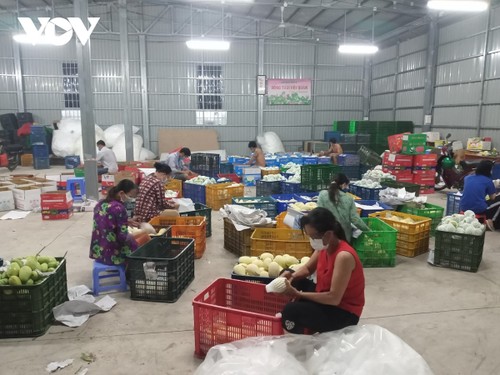 Workers of the Tinh Thoi Agricultural Service Cooperative in Cao Lanh city are packaging mangoes for exports. Workers of the Tinh Thoi Agricultural Service Cooperative in Cao Lanh city are packaging mangoes for exports. |
Located beside the Tien River, Tinh Thoi commune has many favorable factors to develop orchards, especially mangoes. The commune's mango growing area has reached more than 800 hectares, with an annual output of 10,000 tons of mainly Cat Chu and Cat Hoa Loc mangoes.
In the past, mangoes were mainly sold to the domestic market. In recent years, when the Vietnamese good agricultural practice standards have been applied to the production process, Dong Thap mangoes have been exported to many countries and are favored by foreign consumers because of their sweet taste and eye-catching colors.
Le Thanh Van, a member of the Tinh Thoi Agricultural Service Cooperative in Cao Lanh City, says the overseas sales of mangoes has changed farmers’ way of thinking and farming.
Each member of the cooperative has adopted the VietGap standards and strictly follows a safe, high-quality production process to meet the particular requirements of importing countries.
Van said this has improved the quality of Cao Lanh mangoes for domestic consumers, too. He added the cooperative members were very happy that last year the first batch of mangoes was exported to the European market and created a positive impression of Cao Lanh's mango industry.
“Farmers are very excited and are trying to adhere to the quality requirements set by foreign markets. Our domestic market is very competitive so we also have to try our best here. We must abide by a safe growing process to attract the consumers,” said Van.
Dong Thap now has nearly 14,400 ha of mangoes, with an annual output of 137,000 tons, the most in the Mekong Delta. Local farmers have not only adopted new farming techniques, but have also conformed to VietGAP production plus traceability, found ways to increase added value, and sought more markets.
Tran Van Trang, another member of the Tinh Thoi Agricultural Service Cooperative, said that the products of Tinh Thoi farmers meet the standards for export to countries around the world, regardless of the kind of market.
“What we want is to export as much as possible to earn higher profits. That will encourage us to increase our mango output. In addition, the cooperative needs to persuade its members to invest in safe production to win the trust of consumers and expand the domestic market,” said Trang.
Vo Tan Bao, the cooperative’s Director, says that exporting mangoes to demanding markets has motivated local farmers to pay greater attention to standards, set up growing area codes, apply technical advances in production, and use organic or biological fertilizers to ensure product quality and traceability.
Bao said this model has enabled local mangoes be exported and built the brand of Dong Thap mangoes in both domestic and foreign markets.
“This year the cooperative plans to buy a post-harvest mango washing machine, a mango juicer, and a mango drying machine. The cooperative is producing for a chain in which first-class mangoes are delivered to supermarkets, second-class mangoes are cut and dried, and third-class mangoes are used to make mango juice,” according to Bao.
He added this has increased mango profits. The cooperative has worked with businesses to sell the dried mango and mango juice in supermarkets, and export stable quantities to Japan and South Korea.
This year businesses, cooperatives, and mango growers in Dong Thap province have jointly outlined a plan to achieve a bumper harvest with high-quality products for export.